|
|
|
Sort Order |
|
|
|
Items / Page
|
|
|
|
|
|
|
| Srl | Item |
| 1 |
ID:
183442
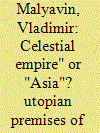

|
|
|
|
|
| Summary/Abstract |
This article deals with the philosophical foundations and historical consequences of two influential political concepts in the Far East: New Celestial Empire and Asia as Method. The author shows that politics in the Far East have been traditionally based on the categories of the Void and Transformation, which gave rise to a specific type of Utopian consciousness with its motif of universal co-being within the encompassing yet singular event. The New Celestial Empire concept reflects global aspirations of the PRC, taking into consideration local specifics. The concept of Asia as Method aims at decolonization and deimperialization in the Commonwealth of Independent States (CIS) and is popular in Japan, South Korea, Taiwan, and Hong Kong. The author examines the confrontation between these theories and suggests ways for their possible integration.
|
|
|
|
|
|
|
|
|
|
|
|
|
|
|
|
| 2 |
ID:
052732
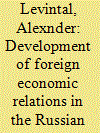

|
|
|
|
|
| Publication |
Apr-Jun 2004.
|
|
|
|
|
|
|
|
|
|
|
|
|
|
|
|
| 3 |
ID:
051667
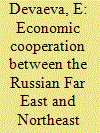

|
|
|
| 4 |
ID:
010527
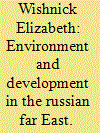

|
|
|
|
|
| Publication |
Feb 1996.
|
| Description |
99-122
|
|
|
|
|
|
|
|
|
|
|
|
|
|
|
|
| 5 |
ID:
152673
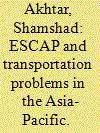

|
|
|
|
|
| Summary/Abstract |
International Affairs: Dr. Akhtar, the United Nations Economic and Social Commission for Asia and the Pacific (ESCAP) deals with a wide range of problems, but since the purpose of your visit to Moscow is to participate in the third session of the Ministerial Conference on Transport, it would be natural if we started by talking about transport. What effect does the process of unification of the transport networks of Asia-Pacific countries have on trade in the region and on economic and other ties in it?
|
|
|
|
|
|
|
|
|
|
|
|
|
|
|
|
| 6 |
ID:
192518
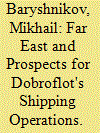

|
|
|
|
|
| Summary/Abstract |
The author examines the role of Dobrovolny Flot (lit. "Volunteer Fleet," hereinafter Dobroflot or the Fleet) in the expansion of shipping traffic between the European and Far Eastern regions of Russia between 1891 and 1914. This paper presents the first ever comprehensive assessment of the effectiveness of this state-controlled shipping enterprise and contributes to the evaluation of commercial performance indicators of maritime freight and passenger transportation in the Russian Empire. An empirical analysis reveals a firm relationship between government support and the stability of coastal shipping operations. Additionally, the author finds that growth of the state-owned company's profitability came mainly from an increase in profits from the transportation of commercial cargoes. Using archival documents, corporate statistics, and records of State Duma debates, the author demonstrates that attempts to increase the volume and activity of interregional transportation led to major changes in the principles of government regulation, that the reform was inspired by the desire to support cargo transportation rather than passenger traffic, that the reform was characterized by cooperation between officials and business circles, and that legislative acts (of 1892, 1902, 1912, and 1914), although flawed in some respects, nevertheless provided a basis for future public-private partnership. This conforms to conclusions that the development of the transportation business was largely caused by growing income resulting from transformations in Russia's infrastructure sector, by the government's regional innovations, and by private interests related to cross-border commercial interaction. The author's findings support arguments that government support could accelerate transformations in the shipping business and contribute to the commercial orientation of the state-owned company's activities.
|
|
|
|
|
|
|
|
|
|
|
|
|
|
|
|
| 7 |
ID:
169696
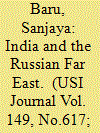

|
|
|
|
|
| Summary/Abstract |
Prime Minister Narendra Modi was the Chief Guest at the fifth meeting of the Eastern Economic Forum (EEF) held at Vladivostok, Russia in early September 2019. The Prime Minister’s participation in this meeting underscored India’s growing interest in building closer economic ties with the Russian Far East. India and Russia have long shared geopolitical perspectives on the balance of power across Eurasia. In the post-Cold War era, both turned their attention to the West. However, over the past decade India has pursued a “Look East Policy”, seeking to regain its political and economic influence in South-east Asia and building new strategic partnerships with East Asian powers like Japan and South Korea. Russia’s ‘pivot to the East’ and India’s move from ‘Look East’ to ‘Act East’ have created a new framework for closer India-Russia geo-economic and geopolitical relations.
|
|
|
|
|
|
|
|
|
|
|
|
|
|
|
|
| 8 |
ID:
011438
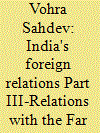

|
|
|
|
|
| Publication |
Jan-March 1997.
|
| Description |
99-108
|
|
|
|
|
|
|
|
|
|
|
|
|
|
|
|
| 9 |
ID:
174877
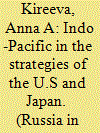

|
|
|
|
|
| Summary/Abstract |
The article seeks to analyze the Indo-Pacific strategies of Japan and the United States as key strategic actors in the region. It identifies their respective goals, how they are stated and what measures are being implemented. Drawing on primary sources in Japanese and English as well as academic literature, the article aims to clarify similarities and differences in the strategies, their distinctive features and how they can be explained. It demonstrates that both states view the Indo-Pacific as a strategic region where they would like to see a regional order based on certain rules and principles and free from China’s dominance. However, the American strategy has been formulated in a more antagonistic way, focusing on strategic competition, while the Japanese version is milder and employs stronger economic measures. Additionally, the article explores the significance of the findings for Russia’s policy in Asia, identifies challenges and opportunities, and proposes a recalibrated course.
|
|
|
|
|
|
|
|
|
|
|
|
|
|
|
|
| 10 |
ID:
153490
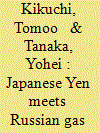

|
|
|
|
|
| Summary/Abstract |
How can Russia and Japan cooperate to contribute to stability and prosperity in the Asia-Pacific region? With 48 trillion cubic meters Russia has the world's largest natural gas reserve while Japan has the world's largest net foreign asset of $3.2 trillion. Linking the two affluent resources creates new transactions and opportunities for the world economy. The implication will be far-reaching beyond the sphere of mere economics and will change the energy and financial world dominated by oil from the Middle East and the USD. For example, Japan imports 82% of its oil from the Middle East--Saudi Arabia (34%), UAE (25%), Qatar (8%), Kuwait (8%), and Iran (5%). On the other hand, the USD is used for 42.09% of international payments and is dominant particularly in Asia where regional currencies such as the Japanese yen (JPY) and the Chinese yuan (CNY) are used only for 3.4% and 1.68% of international payments, respectively.
|
|
|
|
|
|
|
|
|
|
|
|
|
|
|
|
| 11 |
ID:
143672
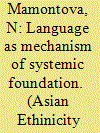

|
|
|
|
|
| Summary/Abstract |
This article explores S. M. Shirokogoroff’s critical approach to the study of language as a part of culture and a means of scientific classifications of mankind into a certain number of linguistic categories. The purpose of this article is to highlight a peculiar but rather underestimated contribution of Shirokogoroff to sociolinguistics, as his ideas were often stranded in critical relation to much that was dominant in social and linguistic thought in the first part of the twentieth century. Three dimensions of his work are mainly the focus of this article: the Ural-Altaic hypothesis, linguistic classifications, and the creation of standard languages in Soviet Russia. Finally, it discusses the applicability of Shirokogoroff’s critique to the contemporary Russian nationalities’ policy towards indigenous minorities.
|
|
|
|
|
|
|
|
|
|
|
|
|
|
|
|
| 12 |
ID:
093096


|
|
|
|
|
| Publication |
2009.
|
| Summary/Abstract |
The spectre of the 1937 'Rape of Nanking' continues to haunt China and Japan. Sixty years ago in Tokyo, the International Military Tribunal for the Far East (IMTFE) announced its definitive 'judgement' of what happened in Nanking. This judgement purported to be intractable. The legal process used to reach it produced a disputed picture instead. The resulting narrative confusion continues to inform how memory of Nanjing is shaped, used and contested. This paper explores the construction of 'Rape of Nanking' narratives at the IMTFE. By demonstrating the inherently contested nature of narratives produced by adversarial legal proceedings, it argues that using courts as a panacea for postwar restoration and as validators of traumatic narratives is both short-sighted and ineffective. The IMTFE exemplifies the inadequacy of trial-based post-conflict reconciliation. It is hoped that the lessons learned from Tokyo's limitations will benefit the ongoing quest for tenable models of international justice.
|
|
|
|
|
|
|
|
|
|
|
|
|
|
|
|
| 13 |
ID:
174879
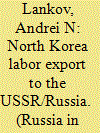

|
|
|
|
|
| Summary/Abstract |
The export of North Korean labor to Russia began in 1946 and continued, almost uninterrupted, until recently. The arrangements behind this labor migration project underwent dramatic revision from time to time, so we have to speak about three different periods: recruitment of North Koreans for work in fisheries in the 1940s and 1950s, dispatch of heavily controlled logging teams in the 1960s-1990s, and work of North Korean building crews, mainly on an autonomous basis, since the late 1990s. These periods reflect the way relations between the two states have been developing, and the change of their political concerns and interests. However, the underlying rationale has not changed much over the decades: the Soviet/Russian state needed cheap and docile labor, while the DPRK needed an additional source of hard currency and North Koreans were enthusiastic about getting lucrative job opportunities. On balance, both sides have been able to get what they hoped to get, and this has ensured the project’s long life.
|
|
|
|
|
|
|
|
|
|
|
|
|
|
|
|
| 14 |
ID:
126850
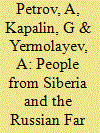

|
|
|
|
|
| Publication |
2013.
|
| Summary/Abstract |
The article describes the contribution of people from Siberia and the Russian Far East to the colonization of California, and the foundation and development of Fort Ross. It also shows the significance of the Russian Orthodox Church's activity in this area.
|
|
|
|
|
|
|
|
|
|
|
|
|
|
|
|
| 15 |
ID:
164061
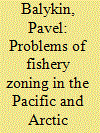

|
|
|
|
|
| Summary/Abstract |
This article notes the importance of food security and the serious lag of this industry in recent years. This, according to the author, is largely due to miscalculations in the modern scheme of fishery zoning. The article proposes to update the fishery zoning of the country's seafood supply as a factor of modern methods of marine spatial planning. It also touches on the problems of international rivalry and interaction, including the development of the Northern Sea Route and the prospects of its use in the context of the Maritime Silk Road project of the 21st Century.
|
|
|
|
|
|
|
|
|
|
|
|
|
|
|
|
| 16 |
ID:
065190
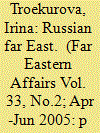

|
|
|
|
|
| Publication |
Apr-Jun 2005.
|
|
|
|
|
|
|
|
|
|
|
|
|
|
|
|
| 17 |
ID:
138471
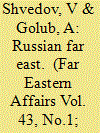

|
|
|
|
|
| Summary/Abstract |
The article examines the image of the Russian Far East and initial methods of revealing it. Questionnaire materials are cited and the results of polls are analyzed. Specific features of respondents' assessment of the territory of their residence are summed up.
|
|
|
|
|
|
|
|
|
|
|
|
|
|
|
|
| 18 |
ID:
121015
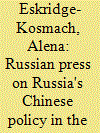

|
|
|
|
|
| Publication |
2012.
|
| Summary/Abstract |
The article is devoted to the changes in the analysis in contemporary Russian press of the approaches towards Russian policy in the Far East in connection with the events of the Chinese-Japanese War in the mid-1890s, when the focus of the international contradictions shifted to the Far East. All of these real and presumed events began to attract more attention from Russian society and the Russian press. The fact of the Chinese defeat in the war against Japan made the Russian press of all political persuasions reconsider and reform their points of view with respect to China and the Far East in general.
|
|
|
|
|
|
|
|
|
|
|
|
|
|
|
|
| 19 |
ID:
189306
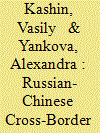

|
|
|
|
|
| Summary/Abstract |
Cross-border cooperation between Russia and China is not only an important part of bilateral cooperation but also a stimulus for the accelerated development of frontier territories. Studies of its results over the past 30 years allow us to trace institutional changes in both countries, as well as general trends in their foreign trade and investment activity. The current state of Russian-Chinese cross-border cooperation is mainly characterized by gradually waning interest on both sides, which belies the growing number of state programs, framework agreements, and initiatives with major political support. China is increasingly cautious about transit benefits and prospects of industrial cooperation at the local level due to the small market capacity of the Russian Far East and its underdeveloped infrastructure. Both countries are displaying distrust, bilateral projects are becoming increasingly uncoordinated, their implementation is delayed, and the results are contrary to expectations. To understand the reasons for this imbalance, the authors consistently analyze the main dimensions and indicators of Russia-China cross-border cooperation, the specifics of the current legal and institutional framework, as well as the results of a number of state programs and major bilateral projects.
|
|
|
|
|
|
|
|
|
|
|
|
|
|
|
|
| 20 |
ID:
169552
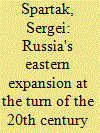

|
|
|
|
|
| Summary/Abstract |
This article considers various aspects of Russia's drive to the East at the end of the 19th century and the start of the 20th, including economic and political components of this process. The author explains reasons for the growing clash of interests between Russia and the United States in the Far East, down to the first systemic crisis in bilateral relations under the influence of Russian expansion in northern China and the Russo-Japanese War. The main positions of American public thought of that time with regard to Russia's Eastern policy are analyzed leading to the conclusion that the Eastern Factor helped shape the negative image of Russia in the eyes of Americans.
|
|
|
|
|
|
|
|
|
|
|
|
|
|
|
|
|
|
|
|
|